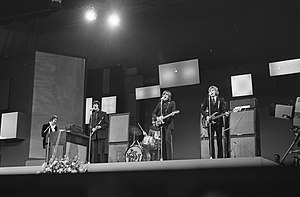Hayward was recommended to Pinder by Eric Burdon of the Animals and was endorsed by famed UK singer Marty Wilde, the leader of the Wilde Three. Pinder phoned Hayward after reading his lead guitarist letter, and was impressed when Hayward played him his 45 rpm single "London is Behind Me" during their car ride to meet the other members in Esher.
After financial misfortune and a confrontation with an audience member, the band soon realised that their style of American blues covers and novelty tunes was not working, and decided to perform primarily their own material. (However, as appearances on French TV show, they continued to do two covers through at least the first half of 1968: the Hayward-sung "Don't Let Me Be Misunderstood", and "Bye Bye Bird", with the vocal and harmonica formerly done by Denny Laine now performed by Ray Thomas.) They were introduced to Decca staff producer Tony Clarke, who produced a recording session which saw Justin Hayward's "Fly Me High" and Mike Pinder's older-styled "Really Haven't Got the Time" (Decca F12607) as the 'Mark Two' Moodies' first single released in May 1967. These picked up both radio airplay and favourable reviews, but failed to chart in the UK. However, the sound gave clues about the direction in which their music would evolve. Their new style, featuring the symphonic sounds of Pinder's mellotron, was introduced on Pinder's song "Love And Beauty" (Decca F 12670) which was issued as a single c/w with Hayward's rocker "Leave This Man Alone" in September 1967. This too was not a UK hit, but further established their "new" Moodies identity. Ray Thomas's flute had been in evidence earlier ("I've Got a Dream") on their debut album; however, it became a far more featured instrument from this point onwards as they started incorporating distinct psychedelic influences, which was later developed in a concept album revolving around an archetypal day in the life of everyman.
Deram Records, Threshold Records, 1967–1972
Days of Future Passed
The Moody Blues' contract with Decca Records was set to expire and they owed the label several thousand pounds in advances. The second album had never materialised either.

Niciun comentariu:
Trimiteți un comentariu